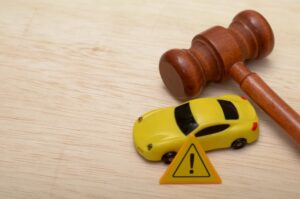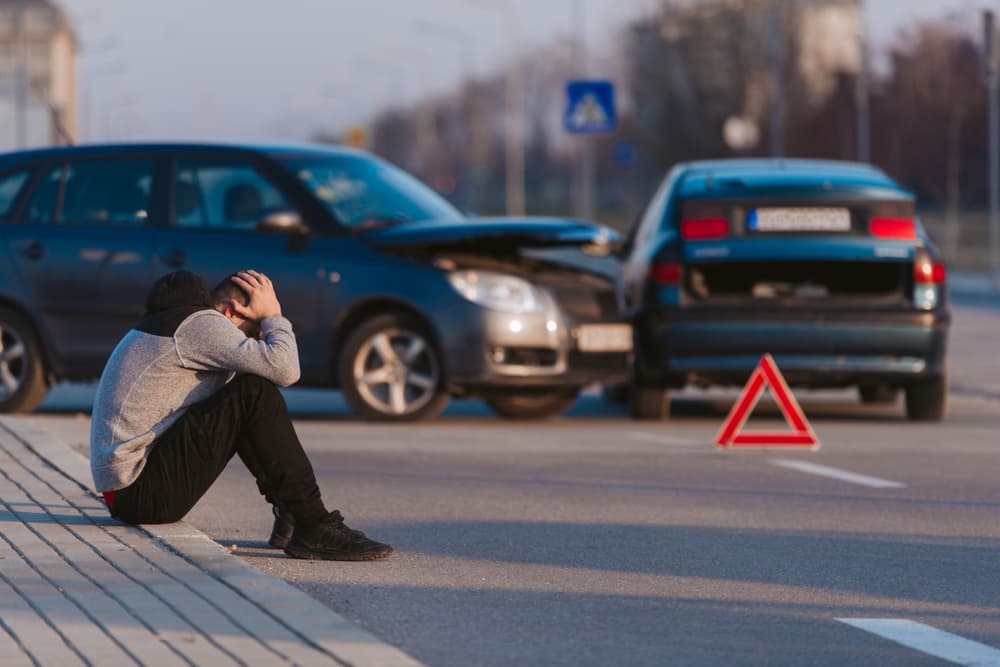When someone unexpectedly pulls out in front of you, triggering a car accident, it’s natural to wonder whether you’re at fault if you struck the negligent driver’s vehicle. In these scenarios, liability is complicated and often depends on various factors, such as speed, right of way, and the actions of both drivers involved. Speaking with a local motor vehicle accident attorney can give you clarity in this area, as every case is unique. Cut-off accidents are common, and a dedicated personal injury lawyer can assess your claim to ensure you receive the compensation you may be entitled to.
Accidents Caused When West Virginia Drivers Fail to Yield
Failure-to-yield accidents, such as when a driver pulls out of a parking lot and into your lane, are common in urban areas such as Morgantown. This type of driver negligence often results in devastating rear-end, phantom, T-bone, and spin-out accidents.
Rear-End Collisions
When a driver suddenly pulls out in front of you, it most commonly results in a rear-end collision. Most drivers do not account for sudden, slower-moving vehicles entering their lanes and, as such, have little time to react. Although the driver who rear-ends the front vehicle is typically considered ‘at fault’, this isn’t the case if you were driving the speed limit, took evasive action, and the other driver unlawfully entered your lane.
Phantom Driver Accidents
Phantom driver accidents occur when a driver recklessly enters the road or changes lanes without looking or signaling, causing the rear driver to stop or decelerate suddenly. In these cases, the rear driver stops in time to avoid the phantom driver, but an accident still occurs. Another driver may rear-end the safe driver, or the evasive action can result in an off-road accident. West Virginia case law recognizes phantom driver liability, but it is hard to prove. Determining fault in these accidents can be challenging, as there is no physical impact between your vehicle and the vehicle that cut you off. Consulting with an attorney is essential to establish liability in these complicated cases.
T-Bone Collisions
T-bone collisions, also known as side-impact or broadside collisions, happen when a vehicle is struck on its side by another vehicle. This type of accident commonly occurs when someone pulls out in front of you at an intersection or fails to yield the right of way. Proving fault in T-bone collisions can be complex, as it requires establishing which driver had the right of way and whether any traffic laws were violated.
Spin-Outs
Spin-outs occur when a vehicle loses control and spins around after trying to avoid a collision with another vehicle that pulled out in front of it. These accidents can happen in situations where the driver pulls out suddenly, and the other driver tries to swerve to avoid a direct impact. Proving fault in spin-out accidents can be challenging as it requires analyzing various factors, including speed, road conditions, and the actions of both drivers involved.
Injuries Commonly Sustained in Cut-Off Accidents
Car accidents caused when someone pulls out in front of you can lead to a wide range of injuries, including:
Head and Brain Injuries
Head and brain injuries can occur when the collision results in a jolt or impact on the head. These injuries can range from concussions to more severe traumatic brain injuries (TBIs) that can have long-term consequences on an individual’s physical and cognitive abilities.
Spinal Cord Injuries

Spinal cord injuries can result from the force and impact of a collision. These injuries can cause temporary or permanent paralysis, depending on the location and severity of the damage to the spinal cord. The road to recovery for individuals with spinal cord injuries can be long and challenging.
Broken Bones
The impact of a collision can cause fractures or breaks in various bones, including arms, legs, ribs, and pelvis. These injuries can significantly impact an individual’s daily life and require extensive medical treatment, rehabilitation, and time off work.
If you suffered an injury in an accident because someone cut you off, call a personal injury attorney immediately to discuss recovering compensation for your injuries.
Difficulty Proving Liability When Someone Pulls Out in Front of You
Proving liability in accidents where someone cuts you off can be challenging. One of the primary reasons is that rear-end collisions are generally assumed to be the fault of the driver who rear-ends the vehicle in front. Insurance companies often try to shift the blame onto the rear driver in an attempt to minimize their liability and compensation payouts.
Determining liability in these cases requires a thorough investigation and analysis of the circumstances surrounding the accident, including which vehicle had the right of way and whether the rear vehicle took evasive actions, such as:
- Honking
- Braking
- Swerving
- Flashing lights
- Decelerating
- Changing lanes
West Virginia courts consider whether the rear driver, while otherwise driving safely, could have avoided the accident. If there was no way to do so, an experienced attorney might show that you were not liable for the crash and demand damages from the other driver.
West Virginia Right-of-Way & Negligence Laws
In West Virginia, general right-of-way rules state that drivers must yield to vehicles already in the intersection or approaching from the right when making a left turn. If someone pulls out in front of you without yielding the right of way, he or she may be held responsible for the accident. Showing that the other driver did not have the right of way and that you were driving safely may be enough to shift liability to the negligent driver.
To hold the driver who pulled out in front of you liable for the accident, you must prove he or she was legally negligent. Negligence in car accident cases refers to the failure of a driver to exercise reasonable care, leading to injury or harm to another party. To prove driver negligence, the following elements must be established:
Duty of Care
You must show that the driver who pulled out in front of you owed a duty of care to other drivers on the road. In West Virginia, all drivers have a legal duty to drive safely and responsibly, so this point is seldom challenged.
Breach of Duty
You must demonstrate that the driver breached his duty of care by failing to uphold the standard of behavior expected of a reasonable driver. This can include violations of traffic laws or reckless driving.
Causation
You must establish a causal link between the driver’s breach of duty and the injuries you sustained. This means showing that the driver’s actions directly caused the accident and your injuries.
Damages
You must provide evidence of the damages you suffered as a direct result of the accident. It can include medical bills, lost earnings, pain and suffering, and other related expenses.
Proving driver negligence after someone cuts you off is especially difficult in West Virginia. It requires gathering evidence, such as accident reports, witness statements, and photographs, to reconstruct the accident. Your testimony alone isn’t enough. An experienced personal injury attorney can assist in building a strong case and advocating for your rights if a negligent driver pulled out in front of you.
Recoverable Damages in Motor Vehicle Accident Cases
You may be entitled to compensatory damages if you suffered an injury in a traffic accident because someone pulled into your lane. As the name suggests, these damages aim to compensate you for the physical, emotional, and financial losses you suffered as a result of the accident and may include the following:
- Hospital bills
- Doctor visits
- Surgeries
- Medications
- Rehabilitation
- Lost income and earning capacity
- Future anticipated medical expenses and lost earnings
Additionally, West Virginia allows claimants to obtain pain and suffering (non-economic) damages to compensate them for the physical and emotional pain, discomfort, and distress caused by the accident and resulting injuries. It includes the accident’s immediate and long-term effects on your quality of life and personal relationships.
The specific damages you may be entitled to will depend on the circumstances of your case and the extent of your injuries. Call a personal injury attorney to ensure you receive the maximum compensation you deserve after a West Virginia car accident.
Negotiating Settlements with Liable Car Insurers
You may have to negotiate a settlement with the liable auto insurer when someone cuts you off. Most personal injury claims result in mutually agreed-upon insurance payouts. However, insurance companies are known for trying to minimize their liability and payouts, so you should only approach the negotiation process with legal help. An experienced attorney may collect all necessary evidence to support your claim and help you understand the value of your case.
To accurately assess your claim’s value, a personal injury lawyer will initially calculate medical expenses, lost earnings, property damage, and pain and suffering damages (generally a multiple of your economic losses). She may then retain medical experts to assess the extent of your injuries and future medical needs, followed by occupational and economic experts to calculate future lost earnings. Adding these values together can give you a fair settlement estimate, which is necessary for ensuring you’re not lowballed.
Why Call a Personal Injury Lawyer Immediately After a Complex Rear-End Accident
If another driver unlawfully pulled out in front of you, causing an accident, contact a personal injury lawyer as soon as possible. Drivers will lie about the event, often claiming you rear-ended them without cause. Seeking legal representation immediately, especially before talking to insurers, can significantly impact the outcome of your case.
Protection of Your Rights
A personal injury lawyer will protect your rights throughout the legal process. He will handle communication with insurance companies and negotiate settlements to ensure you receive the compensation you deserve.
Thorough Investigation
An attorney will thoroughly investigate the accident, gather evidence, interview witnesses, and reconstruct the events leading to the collision. This investigation is important for establishing liability and strengthening your case when your vehicle struck the negligent driver’s vehicle.
Litigation Representation
A personal injury lawyer is prepared to take your case to court if a settlement cannot be reached through negotiation. This happens more often in cases where a driver pulls out in front of you because insurers have stronger legal grounds to deny your claims, i.e., you collided with the other vehicle. Without video evidence and witness statements, adjusters may stand by this denial and force you to sue. Experienced car accident litigators can take your claims to court and ask the judge to decide liability. This determination may result in a fair settlement, but it takes time.
Obtaining Legal Representation Without Any Upfront Fees or Costs

One concern many accident victims have is the cost of hiring a car accident lawyer in West Virginia. Fortunately, most personal injury attorneys work on a contingency fee basis. This means you do not have to pay any upfront fees or costs to obtain legal representation. A contingency fee agreement allows you to hire a lawyer without financial risk. If she does not win your case and recover compensation on your behalf, you do not have to pay any legal fees.
If your attorney successfully secures a settlement or award, his fee will be a percentage of the recovered amount in addition to the repayment of costs. Contingency fee arrangements ensure that anyone can access quality legal representation in West Virginia regardless of financial situation. It allows you to focus on your recovery without worrying about the cost of legal services.
Call a West Virginia Car Accident Lawyer
West Virginia laws and regulations surrounding motor vehicle collisions when a driver pulls out in front of you are complex. Having an experienced attorney by your side is important for protecting your rights and recovering needed financial compensation. Contact a personal injury lawyer as soon as possible after someone pulls out in front of you, as you must act before you’re assumed liable. Dedicated personal injury law firms can provide you with the guidance and support you need during this challenging time.
Jeffery Robinette was admitted to practice law in 1991 and is licensed in all levels of state and federal trial courts in West Virginia. Mr. Robinette is also licensed in all state and federal appeals courts in West Virginia and the United States Supreme Court. As a National Board Certified Trial Attorney who has handled hundreds of motor vehicle, injury, and construction defect claims and a leading author on insurance claims settlement issues and difficulties in West Virginia, Jeff Robinette is uniquely qualified to represent your best interest.





